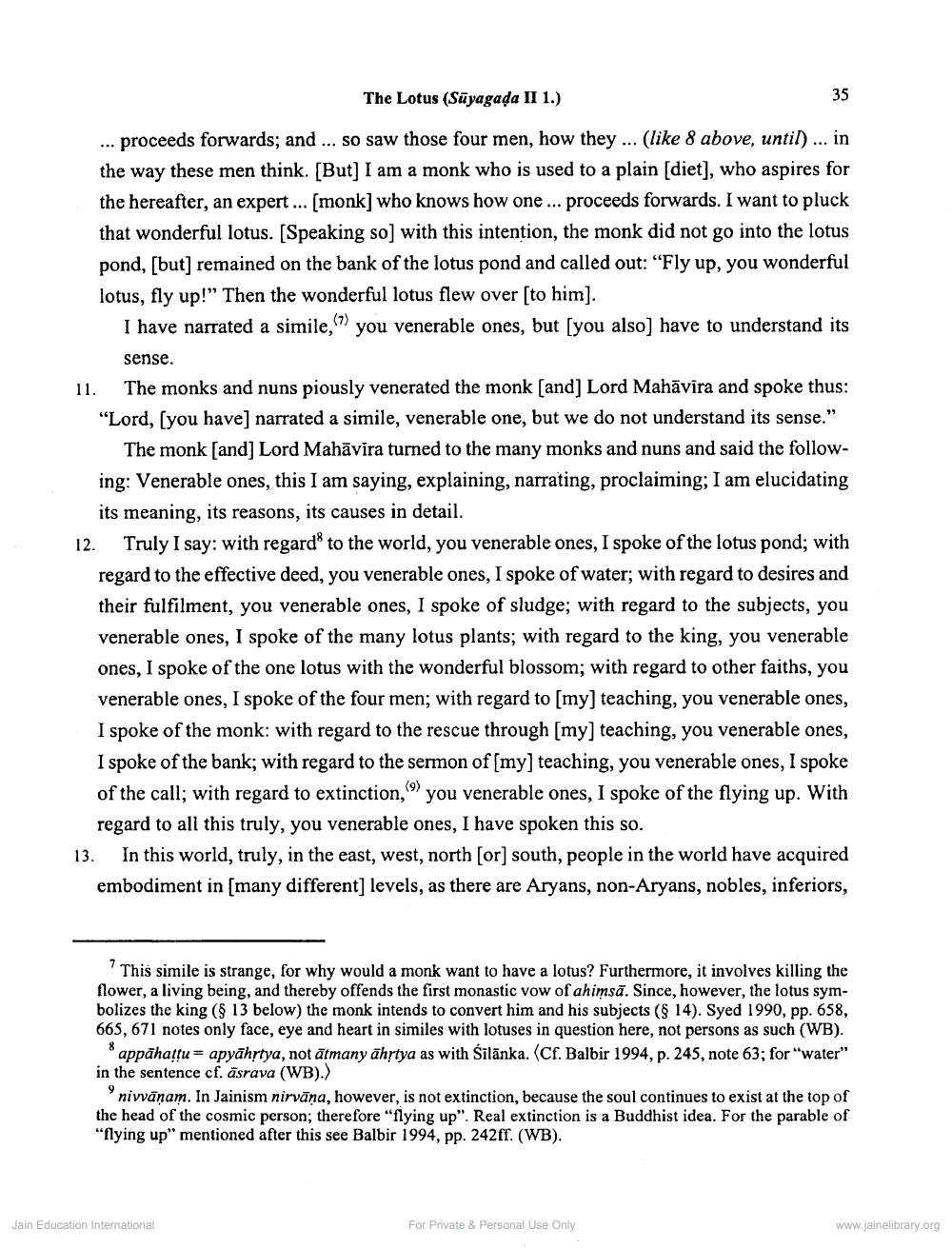________________
The Lotus (Sūyagada II 1.) ... proceeds forwards; and ... so saw those four men, how they ... (like 8 above, until)... in the way these men think. [But] I am a monk who is used to a plain (diet), who aspires for the hereafter, an expert... (monk] who knows how one ... proceeds forwards. I want to pluck that wonderful lotus. Speaking so) with this intention, the monk did not go into the lotus pond, [but] remained on the bank of the lotus pond and called out: “Fly up, you wonderful lotus, fly up!” Then the wonderful lotus flew over [to him].
I have narrated a simile, you venerable ones, but (you also) have to understand its
sense. 11. The monks and nuns piously venerated the monk [and] Lord Mahāvīra and spoke thus: “Lord, [you have) narrated a simile, venerable one, but we do not understand its sense."
The monk [and] Lord Mahāvīra turned to the many monks and nuns and said the following: Venerable ones, this I am saying, explaining, narrating, proclaiming; I am elucidating
its meaning, its reasons, its causes in detail. 12. Truly I say: with regard to the world, you venerable ones, I spoke of the lotus pond; with
regard to the effective deed, you venerable ones, I spoke of water, with regard to desires and their fulfilment, you venerable ones, I spoke of sludge; with regard to the subjects, you venerable ones, I spoke of the many lotus plants, with regard to the king, you venerable ones, I spoke of the one lotus with the wonderful blossom; with regard to other faiths, you venerable ones, I spoke of the four men; with regard to (my) teaching, you venerable ones, I spoke of the monk: with regard to the rescue through (my) teaching, you venerable ones, I spoke of the bank; with regard to the sermon of (my) teaching, you venerable ones, I spoke of the call; with regard to extinction, you venerable ones, I spoke of the flying up. With
regard to all this truly, you venerable ones, I have spoken this so. 13. In this world, truly, in the east, west, north (or) south, people in the world have acquired
embodiment in many different] levels, as there are Aryans, non-Aryans, nobles, inferiors,
7 This simile is strange, for why would a monk want to have a lotus? Furthermore, it involves killing the flower, a living being, and thereby offends the first monastic vow of ahimsā. Since, however, the lotus symbolizes the king ( 13 below) the monk intends to convert him and his subjects (8 14). Syed 1990, pp. 658, 665, 671 notes only face, eye and heart in similes with lotuses in question here, not persons as such (WB).
appāhattu= apyāhrtya, not ātmany āhrtya as with Silānka. (Cf. Balbir 1994, p. 245, note 63; for "water" in the sentence cf. ásrava (WB).)
nivvānam. In Jainism nirvāṇa, however, is not extinction, because the soul continues to exist at the top of the head of the cosmic person; therefore "flying up". Real extinction is a Buddhist idea. For the parable of "flying up" mentioned after this see Balbir 1994, pp. 242 ff. (WB).
Jain Education International
For Private & Personal Use Only
www.jainelibrary.org




